三大从句及反义疑问句及其答案
反义疑问句讲解及答案
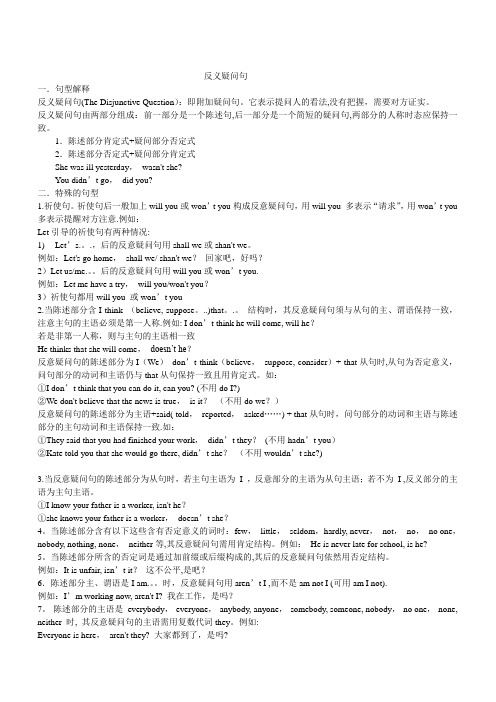
反义疑问句一.句型解释反义疑问句(The Disjunctive Question):即附加疑问句。
它表示提问人的看法,没有把握,需要对方证实。
反义疑问句由两部分组成:前一部分是一个陈述句,后一部分是一个简短的疑问句,两部分的人称时态应保持一致。
1.陈述部分肯定式+疑问部分否定式2.陈述部分否定式+疑问部分肯定式She was ill yesterday,wasn't she?You didn’t go,did you?二.特殊的句型1.祈使句。
祈使句后一般加上will you或won’t you构成反意疑问句,用will you 多表示“请求”,用won’t you 多表示提醒对方注意.例如:Let引导的祈使句有两种情况:1) Let’s.。
.,后的反意疑问句用shall we或shan't we。
例如:Let's go home,shall we/ shan't we?回家吧,好吗?2)Let us/me.。
后的反意疑问句用will you或won’t you.例如:Let me have a try,will you/won't you?3)祈使句都用will you 或won’t you2.当陈述部分含I think (believe, suppose。
..)that。
.。
结构时,其反意疑问句须与从句的主、谓语保持一致,注意主句的主语必须是第一人称.例如: I don’t think he will come, will he?若是非第一人称,则与主句的主语相一致He thinks that she will come,doesn’t he?反意疑问句的陈述部分为I(We)don’t think(believe,suppose, consider)+ that从句时,从句为否定意义,问句部分的动词和主语仍与that从句保持一致且用肯定式。
如:①I don’t think that you can do it, can you? (不用do I?)②We don't believe that the news is true,is it?(不用do we?)反意疑问句的陈述部分为主语+said( told,reported,asked……) + that从句时,问句部分的动词和主语与陈述部分的主句动词和主语保持一致.如:①They said that you had finished your work,didn’t they?(不用hadn’t you)②Kate told you that she would go there, didn’t she?(不用wouldn’t she?)3.当反意疑问句的陈述部分为从句时,若主句主语为I ,反意部分的主语为从句主语;若不为I ,反义部分的主语为主句主语。
反义疑问句讲解及答案
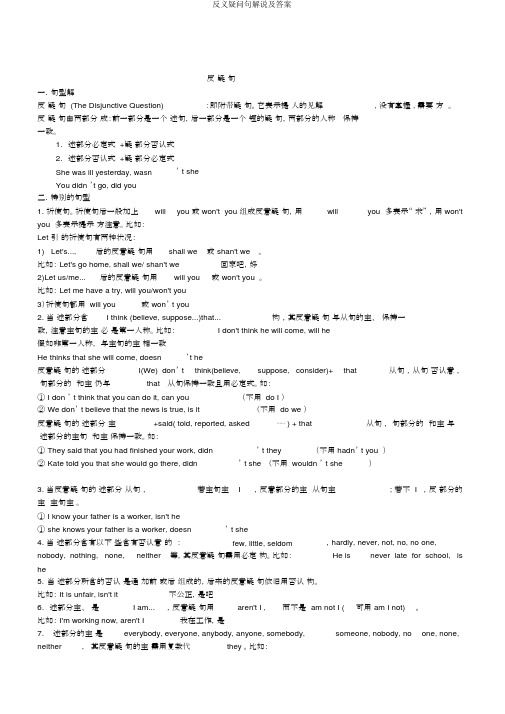
反疑句一.句型解反疑句 (The Disjunctive Question):即附带疑句。
它表示提人的见解, 没有掌握 , 需要方。
反疑句由两部分成:前一部分是一个述句,后一部分是一个短的疑句,两部分的人称保持一致。
1.述部分必定式 +疑部分否认式2.述部分否认式 +疑部分必定式She was ill yesterday, wasn’ t sheYou didn ’t go, did you二.特别的句型1. 祈使句。
祈使句后一般加上will you 或 won't you 组成反意疑句,用will you 多表示“ 求” ,用 won't you 多表示提示方注意。
比如:Let 引的祈使句有两种状况:1) Let's...,后的反意疑句用shall we或 shan't we。
比如: Let's go home, shall we/ shan't we回家吧,好2)Let us/me...后的反意疑句用will you或 won't you 。
比如: Let me have a try, will you/won't you3)祈使句都用 will you或 won’ t you2. 当述部分含I think (believe, suppose...)that...构,其反意疑句与从句的主、保持一致,注意主句的主必是第一人称。
比如:I don't think he will come, will he假如非第一人称,与主句的主相一致He thinks that she will come, doesn’t he反意疑句的述部分I(We) don’ t think(believe,suppose,consider)+that从句,从句否认意,句部分的和主仍与that从句保持一致且用必定式。
如:① I don ’ t think that you can do it, can you(不用 do I )② We don’ t believe that the news is true, is it(不用 do we )反意疑句的述部分主+said( told, reported, asked⋯⋯ ) + that从句,句部分的和主与述部分的主句和主保持一致。
反义疑问句讲解及答案
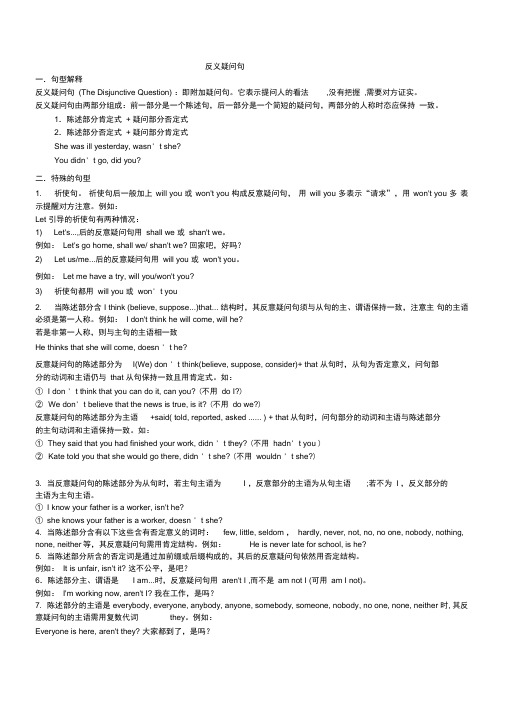
反义疑问句一.句型解释反义疑问句(The Disjunctive Question) :即附加疑问句。
它表示提问人的看法,没有把握,需要对方证实。
反义疑问句由两部分组成:前一部分是一个陈述句,后一部分是一个简短的疑问句,两部分的人称时态应保持一致。
1.陈述部分肯定式+ 疑问部分否定式2.陈述部分否定式+ 疑问部分肯定式She was ill yesterday, wasn' t she?You didn' t go, did you?二.特殊的句型1. 祈使句。
祈使句后一般加上will you 或won't you 构成反意疑问句,用will you 多表示“请求”,用won't you 多表示提醒对方注意。
例如:Let 引导的祈使句有两种情况:1) Let's...,后的反意疑问句用shall we 或shan't we。
例如:Let's go home, shall we/ shan't we? 回家吧,好吗?2) Let us/me...后的反意疑问句用will you 或won't you。
例如:Let me have a try, will you/won't you?3) 祈使句都用will you 或won' t you2. 当陈述部分含I think (believe, suppose...)that... 结构时,其反意疑问句须与从句的主、谓语保持一致,注意主句的主语必须是第一人称。
例如:I don't think he will come, will he?若是非第一人称,则与主句的主语相一致He thinks that she will come, doesn ' t he?反意疑问句的陈述部分为I(We) don ' t think(believe, suppose, consider)+ that 从句时,从句为否定意义,问句部分的动词和主语仍与that 从句保持一致且用肯定式。
反义疑问句讲解及答案
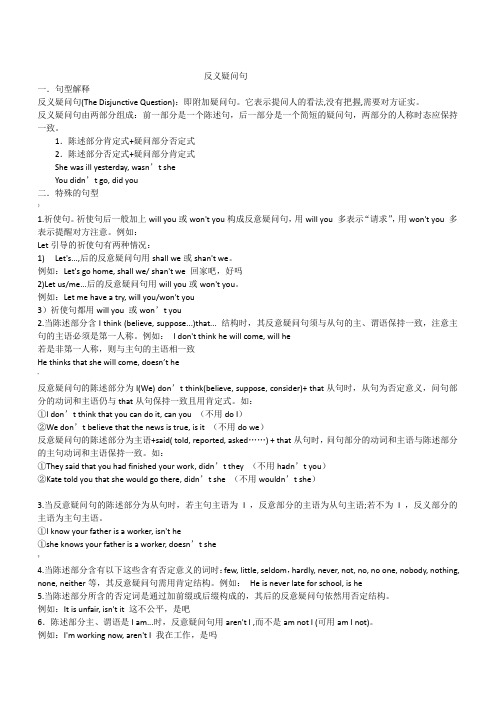
反义疑问句一.句型解释反义疑问句(The Disjunctive Question):即附加疑问句。
它表示提问人的看法,没有把握,需要对方证实。
反义疑问句由两部分组成:前一部分是一个陈述句,后一部分是一个简短的疑问句,两部分的人称时态应保持一致。
1.陈述部分肯定式+疑问部分否定式2.陈述部分否定式+疑问部分肯定式She was ill yesterday, wasn’t sheYou didn’t go, did you二.特殊的句型》1.祈使句。
祈使句后一般加上will you或won't you构成反意疑问句,用will you 多表示“请求”,用won't you 多表示提醒对方注意。
例如:Let引导的祈使句有两种情况:1) Let's...,后的反意疑问句用shall we或shan't we。
例如:Let's go home, shall we/ shan't we 回家吧,好吗2)Let us/me...后的反意疑问句用will you或won't you。
例如:Let me have a try, will you/won't you3)祈使句都用will you 或won’t you2.当陈述部分含I think (believe, suppose...)that... 结构时,其反意疑问句须与从句的主、谓语保持一致,注意主句的主语必须是第一人称。
例如:I don't think he will come, will he若是非第一人称,则与主句的主语相一致He thinks that she will come, doesn’t he"反意疑问句的陈述部分为I(We) don’t think(believe, suppose, consider)+ that从句时,从句为否定意义,问句部分的动词和主语仍与that从句保持一致且用肯定式。
反义疑问句讲解及答案
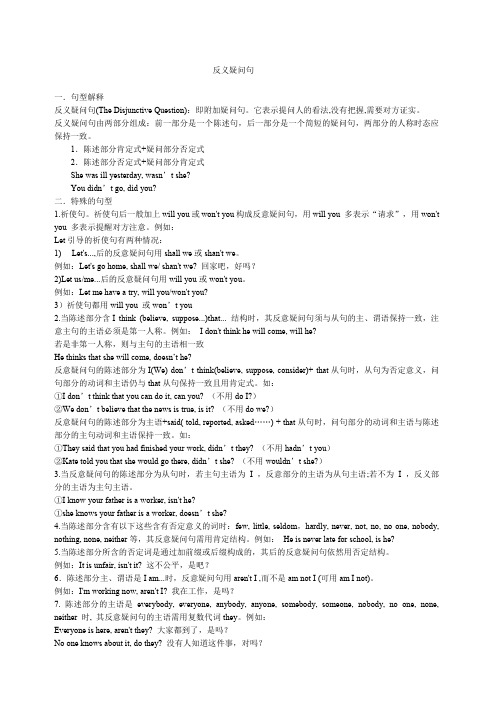
反义疑问句一.句型解释反义疑问句(The Disjunctive Question):即附加疑问句。
它表示提问人的看法,没有把握,需要对方证实。
反义疑问句由两部分组成:前一部分是一个陈述句,后一部分是一个简短的疑问句,两部分的人称时态应保持一致。
1.陈述部分肯定式+疑问部分否定式2.陈述部分否定式+疑问部分肯定式She was ill yesterday, wasn’t she?You didn’t go, did you?二.特殊的句型1.祈使句。
祈使句后一般加上will you或won't you构成反意疑问句,用will you 多表示“请求”,用won't you 多表示提醒对方注意。
例如:Let引导的祈使句有两种情况:1) Let's...,后的反意疑问句用shall we或shan't we。
例如:Let's go home, shall we/ shan't we? 回家吧,好吗?2)Let us/me...后的反意疑问句用will you或won't you。
例如:Let me have a try, will you/won't you?3)祈使句都用will you 或won’t you2.当陈述部分含I think (believe, suppose...)that... 结构时,其反意疑问句须与从句的主、谓语保持一致,注意主句的主语必须是第一人称。
例如:I don't think he will come, will he?若是非第一人称,则与主句的主语相一致He thinks that she will come, doesn’t he?反意疑问句的陈述部分为I(We) don’t think(believe, suppose, consider)+ that从句时,从句为否定意义,问句部分的动词和主语仍与that从句保持一致且用肯定式。
反义疑问句讲解及答案
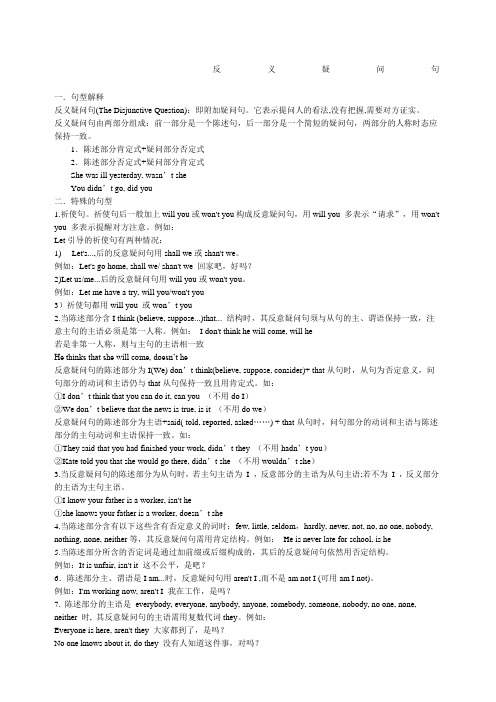
反义疑问句一.句型解释反义疑问句(The Disjunctive Question):即附加疑问句。
它表示提问人的看法,没有把握,需要对方证实。
反义疑问句由两部分组成:前一部分是一个陈述句,后一部分是一个简短的疑问句,两部分的人称时态应保持一致。
1.陈述部分肯定式+疑问部分否定式2.陈述部分否定式+疑问部分肯定式She was ill yesterday, wasn’t sheYou didn’t go, did you二.特殊的句型1.祈使句。
祈使句后一般加上will you或won't you构成反意疑问句,用will you 多表示“请求”,用won't you 多表示提醒对方注意。
例如:Let引导的祈使句有两种情况:1) Let's...,后的反意疑问句用shall we或shan't we。
例如:Let's go home, shall we/ shan't we 回家吧,好吗?2)Let us/me...后的反意疑问句用will you或won't you。
例如:Let me have a try, will you/won't you3)祈使句都用will you 或won’t you2.当陈述部分含I think (believe, suppose...)that... 结构时,其反意疑问句须与从句的主、谓语保持一致,注意主句的主语必须是第一人称。
例如:I don't think he will come, will he若是非第一人称,则与主句的主语相一致He thinks that she will come, doesn’t he反意疑问句的陈述部分为I(We) don’t think(believe, suppose, consider)+ that从句时,从句为否定意义,问句部分的动词和主语仍与that从句保持一致且用肯定式。
反义疑问句详细讲解及习题及答案
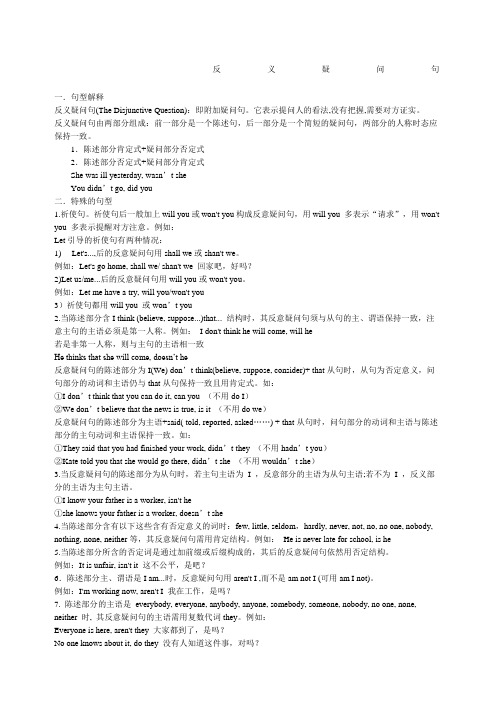
反义疑问句一.句型解释反义疑问句(The Disjunctive Question):即附加疑问句。
它表示提问人的看法,没有把握,需要对方证实。
反义疑问句由两部分组成:前一部分是一个陈述句,后一部分是一个简短的疑问句,两部分的人称时态应保持一致。
1.陈述部分肯定式+疑问部分否定式2.陈述部分否定式+疑问部分肯定式She was ill yesterday, wasn’t sheYou didn’t go, did you二.特殊的句型1.祈使句。
祈使句后一般加上will you或won't you构成反意疑问句,用will you 多表示“请求”,用won't you 多表示提醒对方注意。
例如:Let引导的祈使句有两种情况:1) Let's...,后的反意疑问句用shall we或shan't we。
例如:Let's go home, shall we/ shan't we 回家吧,好吗?2)Let us/me...后的反意疑问句用will you或won't you。
例如:Let me have a try, will you/won't you3)祈使句都用will you 或won’t you2.当陈述部分含I think (believe, suppose...)that... 结构时,其反意疑问句须与从句的主、谓语保持一致,注意主句的主语必须是第一人称。
例如:I don't think he will come, will he若是非第一人称,则与主句的主语相一致He thinks that she will come, doesn’t he反意疑问句的陈述部分为I(We) don’t think(believe, suppose, consider)+ that从句时,从句为否定意义,问句部分的动词和主语仍与that从句保持一致且用肯定式。
(完整版)反义疑问句详细讲解及习题及答案
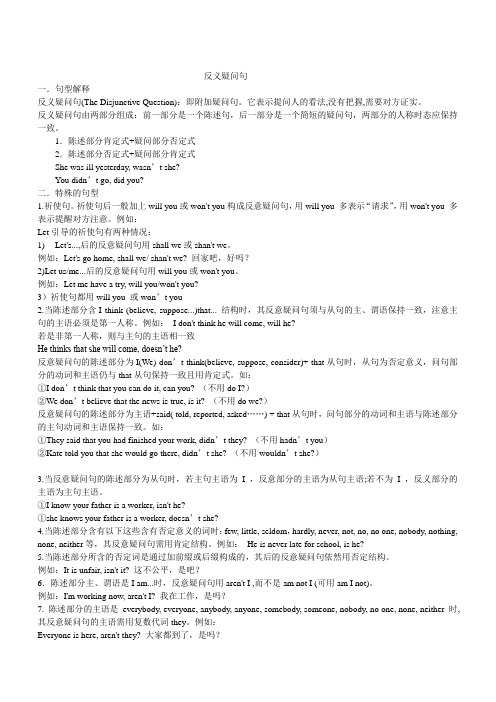
反义疑问句一.句型解释反义疑问句(The Disjunctive Question):即附加疑问句。
它表示提问人的看法,没有把握,需要对方证实。
反义疑问句由两部分组成:前一部分是一个陈述句,后一部分是一个简短的疑问句,两部分的人称时态应保持一致。
1.陈述部分肯定式+疑问部分否定式2.陈述部分否定式+疑问部分肯定式She was ill yesterday, wasn’t she?You didn’t go, did you?二.特殊的句型1.祈使句。
祈使句后一般加上will you或won't you构成反意疑问句,用will you 多表示“请求”,用won't you 多表示提醒对方注意。
例如:Let引导的祈使句有两种情况:1) Let's...,后的反意疑问句用shall we或shan't we。
例如:Let's go home, shall we/ shan't we? 回家吧,好吗?2)Let us/me...后的反意疑问句用will you或won't you。
例如:Let me have a try, will you/won't you?3)祈使句都用will you 或won’t you2.当陈述部分含I think (believe, suppose...)that... 结构时,其反意疑问句须与从句的主、谓语保持一致,注意主句的主语必须是第一人称。
例如:I don't think he will come, will he?若是非第一人称,则与主句的主语相一致He thinks that she will come, doesn’t he?反意疑问句的陈述部分为I(We) don’t think(believe, suppose, consider)+ that从句时,从句为否定意义,问句部分的动词和主语仍与that从句保持一致且用肯定式。
- 1、下载文档前请自行甄别文档内容的完整性,平台不提供额外的编辑、内容补充、找答案等附加服务。
- 2、"仅部分预览"的文档,不可在线预览部分如存在完整性等问题,可反馈申请退款(可完整预览的文档不适用该条件!)。
- 3、如文档侵犯您的权益,请联系客服反馈,我们会尽快为您处理(人工客服工作时间:9:00-18:30)。
宾语从句语法讲解一、宾语从句根据引导词的不同可分为三种类型:1. 由that引导的宾语从句。
如:We knew (that)we should learn from each other.2. 由if/whether引导的宾语从句。
如:Please tell me if/whether you have been to America.3. 由who,where,how等连接代词或连接副词引导的宾语从句。
如:Can you tell me how I can get to the nearest post office?二、三要素1. 引导词如果从句是陈述句,引导词用that(that在口语或非正式文体中常省略);如果从句是一般疑问句,引导词用if/whether;如果从句是特殊疑问句,引导词用由疑问词转换而来的疑问代词/副词。
2. 语序①陈述句变为宾语从句,语序不变,即仍用陈述语序。
如:He is an honest boy. The teacher said. →The teacher said(that)he was an honest boy.②一般疑问句和特殊疑问句变为宾语从句,语序变为陈述语序。
如:Does he work hard?I wonder.→I wonder if/whether he works hard.When did he leave?I don’t know. →I don’t know when he left.3. 时态①如果主句是现在的时态,从句的时态可根据实际情况而定。
如:I have heard(that)he will come back next week.②如果主句是过去的某种时态,那么从句的时态一定要用过去的某种时态。
如:He said(that)there were no classes yesterday.注意:如果宾语从句表述的是客观真理、自然现象等时,不管主句是什么时态,从句都要用一般现在时。
如:He said that light travels much faster than sound.三、人称的变化和标点的使用1. 从句的主语如果是第一人称,变为宾语从句则与主句的主语一致;如果是第二人称,则与主句的宾语一致;如果是第三人称,不用变化。
如:“May I use your knife?”He asked me. →He asked me if he might use my knife.“Do you know her telephone number?”He asked me. →He asked me if I know her telephone number.2. 宾语从句的标点均由主句决定。
主句是陈述句,用句号;主句是疑问句,用问号。
如:Who will give us a talk?I don’t know. →I don’t know who will give us a talk.Do you know?Where does he live?→Do you know where he lives?四、if和when既能引导时间状语从句,又能引导宾语从句。
因此,遇到它们就要认真分析一下,它们究竟属于哪一类从句。
如:If it rains tomorrow,I won’t come.(时间状语从句)I don’t know if it will rain tomorrow. (宾语从句)五、从句的简化1. 当主句谓语动词是find,see,watch,hear等感官动词时,从句常简化为“宾语+宾补”结构,宾补为不带to的不定式或V-ing形式。
如:She found that the wallet lay/was lying on the ground. →She found the wallet lie/lying on the ground.2. 当主句谓语动词是hope,wish,decide,forget,plan,agree等,且主句主语与从句主语相同时,从句可简化为不定式结构。
如:She agreed that she could help me with my maths. →She agreed to help me with my maths.3. 在连接代词/副词引导的宾语从句中,当从句主语与主句主语或间接宾语一致时,宾语从句可简化为“连接代词/副词+不定式”结构。
如:Can you tell me how I can get to the station?→Can you tell me how to get to the station?宾语从句专项练习一、将下面的句子连接成为含有宾语从句的复合句。
1.These flowers are from Guangdong. He said.He said _______ these flowers _______ from Guangdong.2. Light travels faster than sound. My teacher told me.My teacher told me _____ light _______ faster than sound.3.There will be a meeting in five days. Jack didn’t know.Jack didn’t know _____ there _____ ____ a meeting in five days.4.Can they speak French? I want to know.I want to know ______ _______ _______ _______ French.5.Are the children playing games? Tell me.Tell me ______ the children ______ ______ games.6.Have you finished your homework yet? Mr. Zhao asked Ma Gang.Mr. Zhao asked Ma Gang ____ _____ ____ ____ ___ homework yet.7.How many people can you see in the picture? Who knows?Who knows ______ _____ _____ ____ _____ ______ in the picture?8.Where did she park her car? Do you know?Do you know _____ _____ ____ her car?9.What does he often talk about? The girl wondered.The girl wondered _____ _____ often ________ about.10.Who knocked at the door so loudly? I don’t know.I don’ t know ____ _______ at the door so loudly.11. Does he still live in that street? I don't know.I don't know ______ he still _______ in that street.12. What's his name? I asked him.I asked him what _____ _____ _____.13. When does the train arrive? Please tell me.Please tell me ________ _________ ________ _________.14. Do they want fried chicken? He asked the boys.He asked the boys _______ they ______ fried chicken.15. Was the watch made in Shanghai? I don't know.I don't know _______ the watch _______ made in Shanghai.二、选择填空。
( ) 1. What did Mike say? He said ____________________.A. if you are free the next weekB. what colour was itC. the weather is fineD. summer comes after spring( ) 2. Tom asked my friend ________________.A. where was he fromB. that the earth is bigger than the moonC. when did he come backD. not to be so angry( ) 3. Let me tell you __________________.A. how much is the carB. how much does the car costC. how much did I pay for the carD. how much I spent on the car( ) 4. Peter knew _______________.A. whether he has finished reading the bookB. why the boy had so many questionsC. there were 12 months in a yearD. when they will leave for Paris( )5. Could you tell me ___________?A. where do you liveB. who you are waiting forC. who were you waiting forD. where you live in( )6. I can't understand ______the boy alone.A. why she leftB. why did she leaveC. why she had leftD. why had she left( )7. She told me the sun ______ in the east.A. riseB. roseC. risesD. had risen( )8.I don't know ________ up so early last Sunday.A. why did he getB.why he getsC.why does he getD. why he got( )9. The manager came up to see __________.A. what was the matterB. what the matter wasC. what the matter isD. what's the matter( )10. He asked his father _______.A. where it happensB. where did it happenC. how it happenedD. how did it happen( )11. No one tells us______, so we need your help.A. how we should doB. what should we doC. how to do itD. what to do it( )12. Could you please teach me _______ the computer.A. how checkB. to checkC. how to checkD. to how checking( )13.They don't know _______their parents are.A thatB whatC whyD which( )14. ─Where do you think ______ he _____ the TV set?─ Sorry, I've no idea.A./, boughtB. has, boughtC. did, buyD. did bought( ) 15. Our homework has changed a lot. Who can tell _____ it would be like in _____ five years.A. how, anotherB. what, moreC. how ,otherD. what, another( )16. ─ Could you tell me ______? ─ Yes. He ____ to the USA.A. where is he/ has beenB. where he is/ has goneC. where was he/ has beenD. where he was/ has gone( )17. ─Mike wants to know if ____ a picnic tomorrow.─Yes. But if it _______, we'll visit the museum instead.A. you have/ will rainB. you will have/ will rainC. you will have/ rainsD. will you have/ rains ( )18. I really don't know if she _______ it when she ________.A. finds/ arrivesB. finds/ will arriveC. will find/ will arriveD. will find/ arrives( )19.Miss Liu said ______ she would leave the message on the headmaster”s desk.A. thatB. whereC. whichD. what( )20. He asked me _______.A. who will kick the first goal in the World CupB. when was the APEC meeting heldC. when China became a member of the WTOD. where the 2008 Olympics will be held( )21. In the bookshop , a reader asked the shopkeeper ______ Who Moved My Cheese was an interesting book.A. thatB. howC. whatD. if( )22. You must remember _______.A. what your teacher saidB. what did your teacher sayC. your teacher said whatD. what has your teacher said( )23. I don”t know ______ .A. which room I can liveB. which room can I liveC. which room I can live inD. which room can I live in( )24.--Do you know when he ______ back ?--Sorry , I don”t . When he _______back , I”ll tell you .A. comes ; comesB. comes ; will comeC. will come ; comesD. will come ; will come( )25 The girls asked if they ____ some food and drink with them.A. tookB. takeC. takesD. will take( )26 Mary said that she ___ to Guangzhou.A. has never goneB. had never goneC. has never beenD. had never been( )27 The students want to know whether they___ a PE class today.A. hadB. hasC. will haveD. are( )28. Can you tell me___ you were born, Betty?A. whoB. whatC. whenD. that( )29.I don't know ___ they have passed the exam.A. whatB. ifC. whenD. where( )30. Do you know _____ they listened to yesterday evening?A. what B when C why D how三、用合适的连接词填空。
